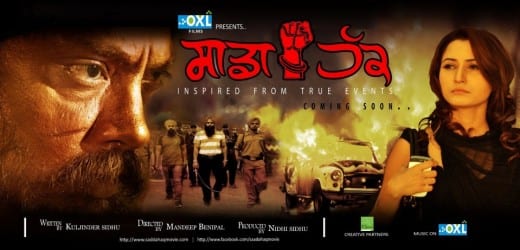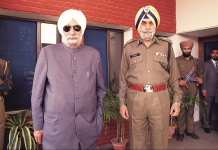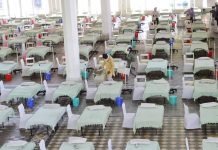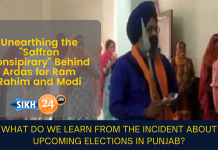The movie Sadda Haq raises multiple issues about the experiences of Punjabi people who lived through the 1980’s & 1990’s. During this period an insurgency against the Indian state was started by Sikhs and was consequently quashed. Many say that the demands raised by insurgents are now a non-issue and we should move on and not dwell on the past. But the subsequent banning of the movie in some states in India and the issues raised in it – are definitely causing such a stir that one has to accept that the issues raised are still very real.
Kushwant Singh – a famous Indian author who is a loyal Indian nationalist, went on air on a BBC documentary in 1999 about the Sikhs and said that the underlying issues that led to the Punjab insurgency have not been addressed and the festering of these issues could raise it’s ugly head once again in the future.
Now what are these issues? The fundamental issues were purely and simply economic ones – the Indian government through the leadership of Indira Gandhi successfully manipulated these Punjabi economic issues into a “faked” frenzy of Sikh Fundamentalism – which quite simply did not exist prior to 1984. Sikhs were radicalized by the 1984 attack on their holiest shrine (Golden Temple) and the subsequent ethnic cleansing pogroms of Sikhs in Delhi and throughout India in November 1984. The issues which were being peacefully campaigned for by Sikhs en masse and Punjabis, prior to 1984, were – fair distribution of Punjab’s river waters or recompense to the Punjabi state for use of it’s waters, fair pricing for paddy, inward economic investment into Punjab, return of Chandigarh to Punjab as it’s capital and more autonomy for the state under a true federal system.
The actual movie is a fictional account which reflects some events that did occur in real life. The main character of Kartar Singh – a successful hockey player, who by his own words states, “I loved two things, hockey and my girlfriend” is pivotal to the reflections of former insurgents and the paths they had to undertake. He was no fanatical Sikh or fundamentalist but a mere normal Punjabi boy who was forced to take up arms by the turn of events that life presented to him.
Now parallels that were stark to me with Kartar Singh were those of Gurdeep Singh Deepa from Herran. Deepa was a normal average Punjabi youth who was led to an insurgent lifestyle. Many thousands of these youth were not fundamentalist Sikhs but were forced by the circumstances they lived in, to choose between a path of being continually harassed by security forces by living at home or taking up arms and defending themselves. Deepa had a girlfriend throughout his life as an insurgent and met his untimely demise in December 1992, by being defrauded by a travel agent who had promised to help him leave India.
Every human being would choose peace over war – the glamorization of revolutionaries and valiant Sikhs needs to be taken on with a pinch of realism. If they had a choice all these Sikhs and revolutionaries would on the whole, choose peace over the hardships of war and bearing arms and being under constant threat of death. To read more about insurgents and their stories I would recommend, “Fighting for Faith & Nation, Dialogues with Sikh Militants” by Cynthia Mahmood.
The second main character in the movie is of Sharon Gill a female researcher, which raises issues of an unknown hidden past and through independent research she learns of the atrocities normal everyday Sikhs had to suffer. Cynthia Mahmood’s story is similar and up until recently she did not openly admit what led her to study the lives of Sikh Militants – please read about the atrocities she had to undergo on http://sikhchic.com/article-detail.php?cat=21&id=817 Another case of female torture is that of Mai Harinder Kaur please read her account on http://www.sikhchic.com/1984/the_crimes_of_indira_gandhi_the_last_time_i_was_in_amritsar_june_1984 Mai was permanently scarred by her trauma and subsequently started blogging about Sikh rights.
Fake encounters or extra-judicial killings of Sikhs and Hindus who lived in Punjab became common place throughout the 1980’s and 1990’s. Jaswant Singh Khalra and his research led to proof of these killings – when he uncovered illegal cremations had taken place throughout Punjab of unidentified bodies. He was subsequently killed for bringing these truths to life. Seehttp://www.khalra.org/index.php for further information.
The movie Sadda Haq has done a good job is raising the issues of Punjab’s recent past – which impede on it’s current future. For those who watch the movie – the movie should act as a spur to quench a thirst for knowledge about what really happened and what one can do peacefully to help bring some redress. Nobody wants war, but learning and asking for ‘your’ or ‘our’ rights is the least we can do. This may cause discomfort for those in the corridors of power as they will have to answer questions they are not comfortable in answering and possibly face legal action.
A reading of the “Game of Love” http://www.amazon.co.uk/Game-Love-Harjinder-Singh/dp/0955458714/ref=sr_1_1?ie=UTF8&qid=1365767226&sr=8-1&keywords=game+of+love+harjinder would give a quick overview to those in search of the truth about the Punjabi in the 1980’s and 1990’s. The book will give you a more in-depth view of what happened and has received rave reviews from all that have read it.





